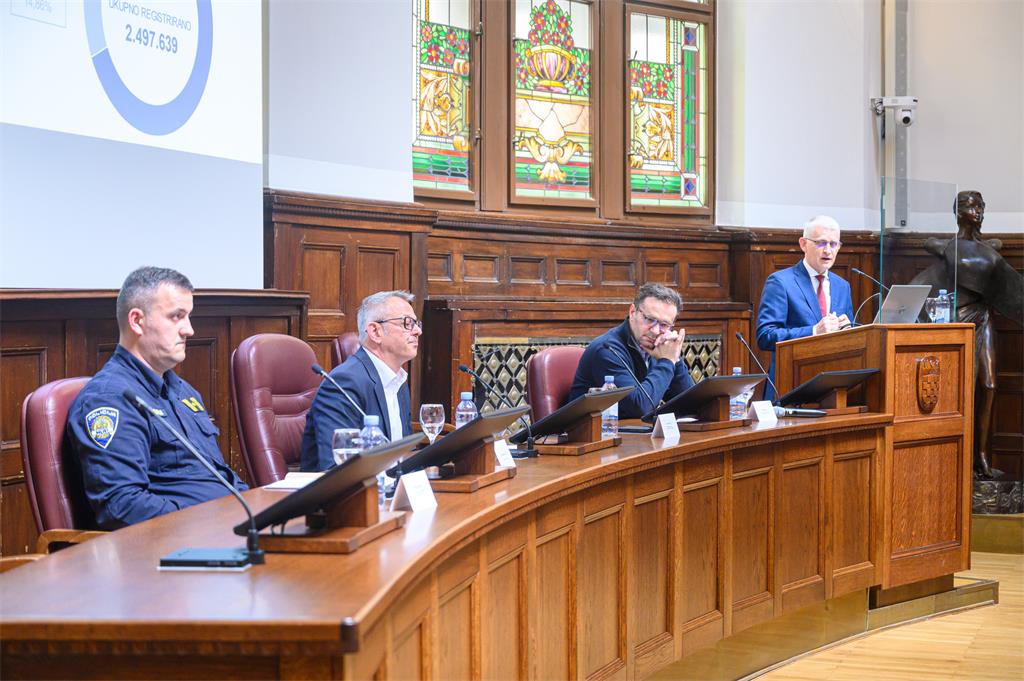03.05.2023.
The representatives of the Fund took part in the expert discussion entitled “Energy Efficient Future of Vehicle Fleet in Croatia: Preconditions and Problems”, which was organised by the Automotive Trade Association and held at the Croatian Chamber of Economy.In part of the discussion on the topic of “Energy efficient vehicles and sustainable waste management” Maja Rajčić, the head of the Energy Efficiency Sector at the Fund, praised the past cooperation of the Fund and the Croatian Chamber of Economy in the implementation of the incentives programmes for energy efficient vehicles. “This is corroborated by the excellent results and the spending of the allocated funds,” said Rajčić, announcing the Fund was planning to continue with the programme with some adjustments to the financing model. A detailed analysis of the current system and results is under way, and after it’s completed, we’ll further optimise the method of granting and percentage of financing, meaning individual incentive amounts.”
An increase in the use of electric vehicles will result in different requirements regarding the disposal of these vehicles i.e., batteries. Zvonimir Majić, the head of the Sector for Special Waste Categories at the Fund, agreed that batteries really were a challenge in terms of the growing numbers of electric vehicles. “The first reason is the lack of specific metals, which are rare in Earth’s crust, and almost non-existent in the EU, such as lithium. The second problem is the disposal of waste batteries. The producers of batteries are traying to develop batteries that could be more readily disassembled, allowing valuable raw materials to be extracted from them. The manufacturers are thinking along the lines of batteries being leased to the owners of electric vehicles, meaning the waste battery would be returned to the factory and used to produce a new one, thus the valuable raw materials would not reach the market,” explained Majić, adding that Croatia will be able to treat the batters from the vehicles produced in the country.
The secretary of the Automotive Trade Association at CCE, Hrvoje Paver, believes that significant amendments to the legislative framework are necessary and would have to introduce benefits for the buyers of electric vehicles. “One of the possibilities we’ve proposed is an increase of the overall budget for co-financing electric vehicles, and if this is not an option, then reducing the co-financed amount per vehicle. The buyers of electric vehicles in Germany are co-financed with 4500-6750 EUR; while in the last round of the call in Croatia, co-financing reached up to 9290 EUR per vehicle. The amount of co-financing in our first neighbour, Slovenia, is half of that in Croatia - 4500 per vehicle,” compared Paver.
Gordana Bursać, who is also the head of the working group at the Automotive Trade Association at CCE, pointed out that the automotive industry had a major role in achieving the electromobility targets, and she praised the cooperation with the Fund in this regard.
The panellists agreed that predicting the future of mobility by 2035 was quite hard, but it was qlear that the trend of more electric vehicles was on the rise, even in the fossil fuel-rich countries, such as Norway.
In the last years, the automotive industry was held back by the disruptions in the supply chains due to a shortage of certain components, which prolonged delivery deadlines. However, this year the supply of the components has stabilised, and market supply has met the demand, which has had a positive impact on the sale results. The data of the European Automobile Manufacturers' Association – ACEA for March show that 28.8% more vehicles were delivered in the EU compared to the same period last year. Josip Zaher, the chairman of the County Chamber Zagreb and advisor the chairman for trade at CCE, said that similar situation was recorded in Croatia. “13,247 new vehicles were registered, which is 35.7% more than in the same period last year. A somewhat larger increase compared to other EU Member States can be explained by the predictions this tourist season will be record-breaking, so in this context car rental companies are preparing to have additional vehicles on standby,” said Josip Zaher, the chairman of the County Chamber Zagreb.





